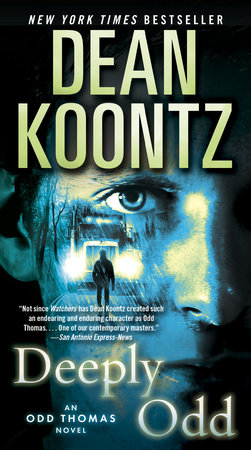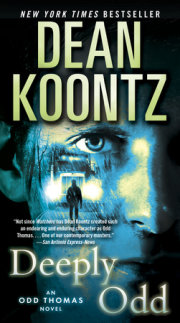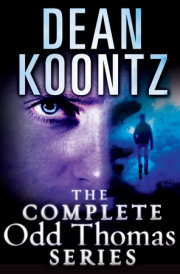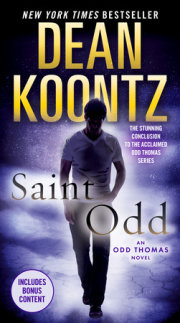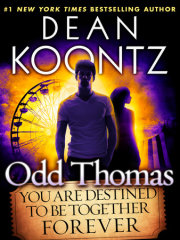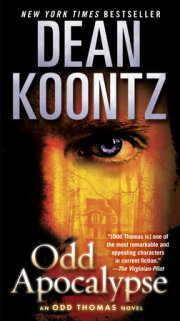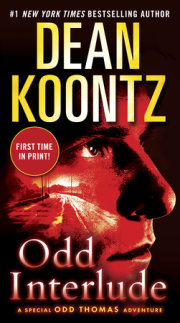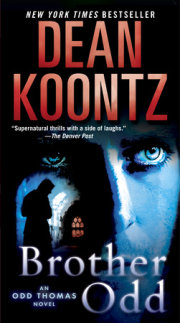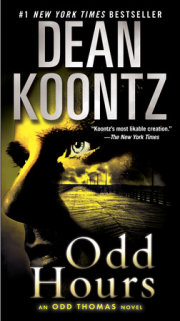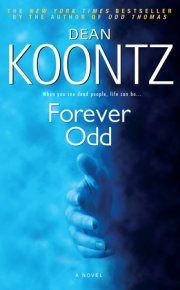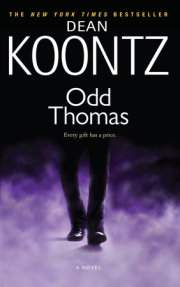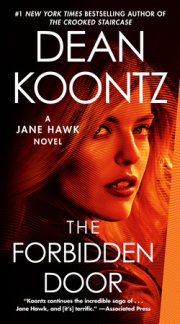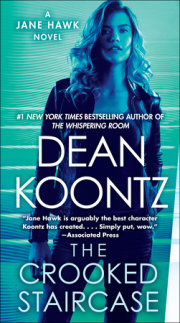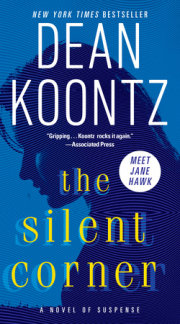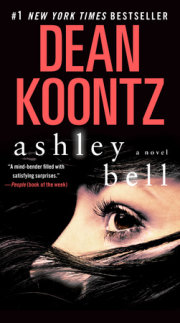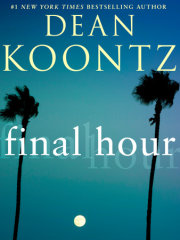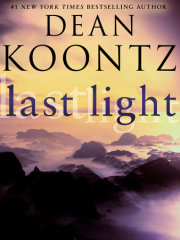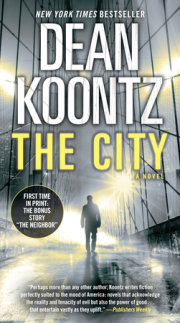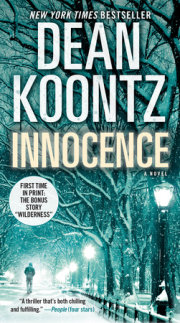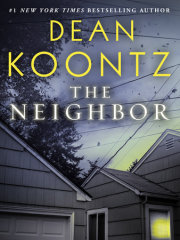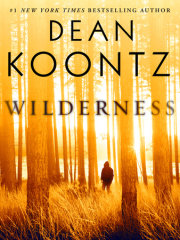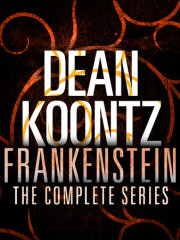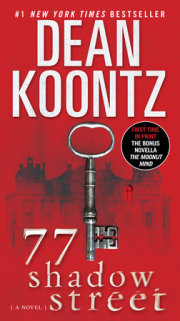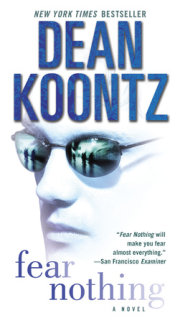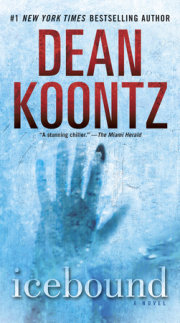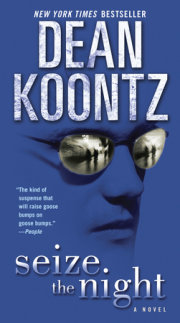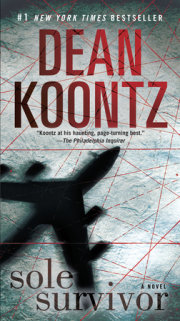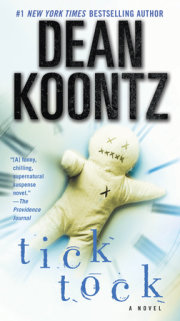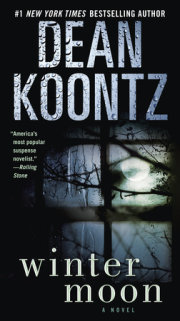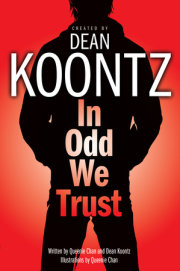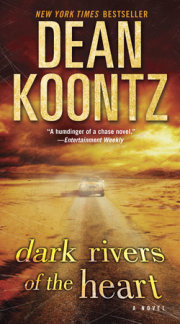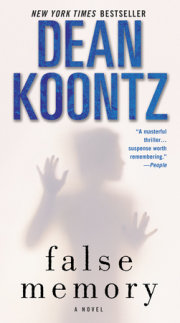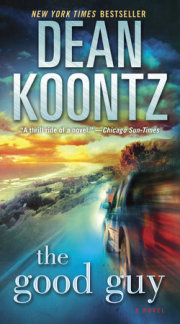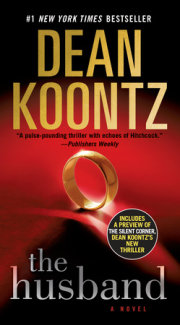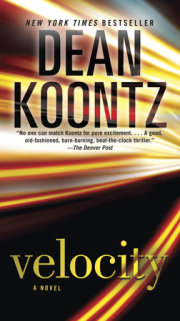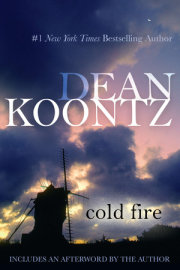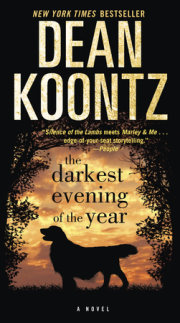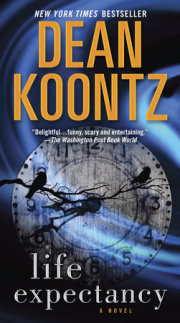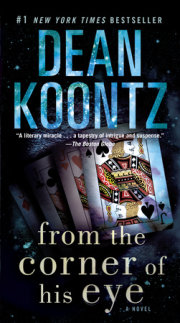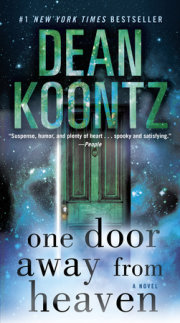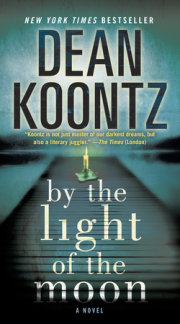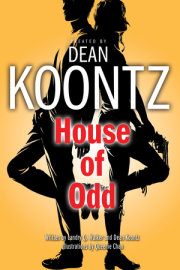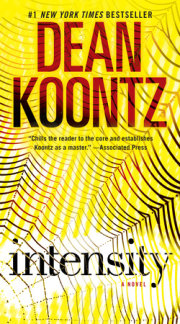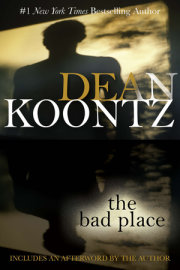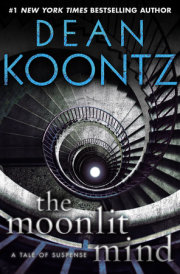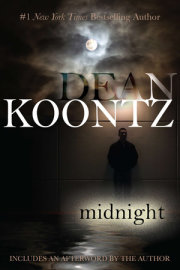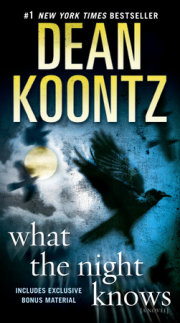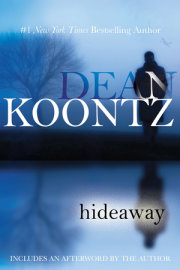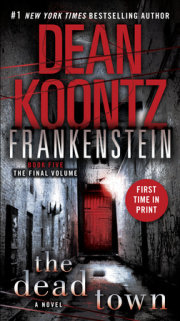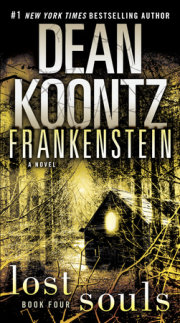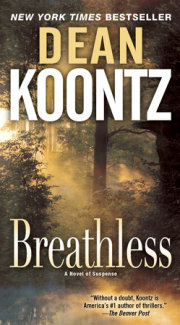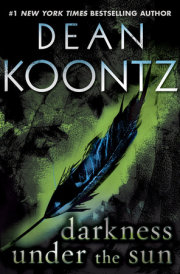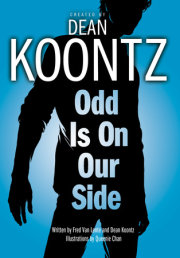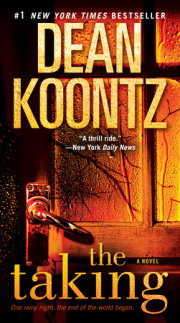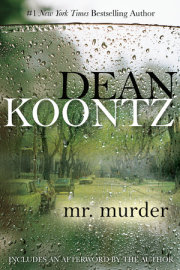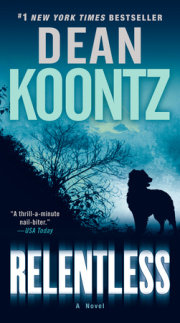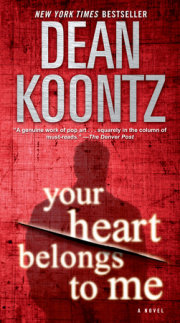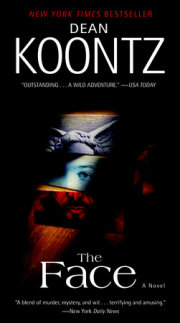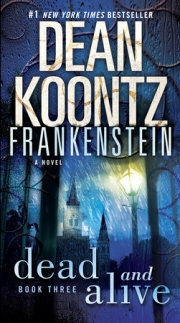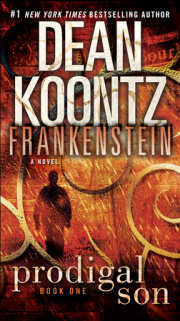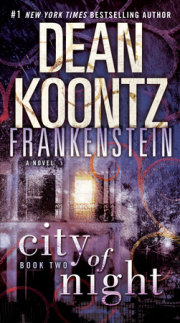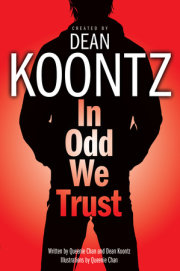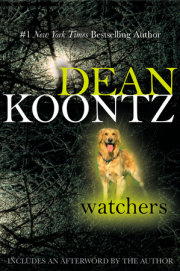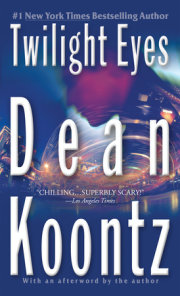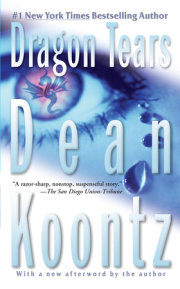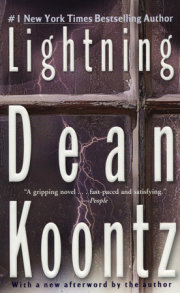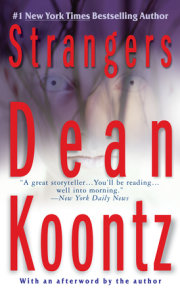One
Before dawn, I woke in darkness to the ringing of a tiny bell, the thimble-size bell that I wore on a chain around my neck: three bursts of silvery sound, a brief silence after each. I was lying on my back in bed, utterly motionless, yet the bell rang three times again. The vibrations that shivered through my bare chest seemed much too strong to have been produced by such a tiny clapper. A third set of three rings followed, and then only silence. I waited and wondered until dawn crept down the sky and across the bedroom windows.
Later that morning in early March, when I walked downtown to buy blue jeans and a few pairs of socks, I met a guy who had a .45 pistol and a desire to commit a few murders. From that encounter, the day grew uglier as surely as the sun moved from east to west.
My name is Odd Thomas. I have accepted my oddness. And I am no longer surprised that I am drawn to trouble as reliably as iron to a magnet.
Nineteen months ago, when I was twenty, I should have been riddled with bullets in that big-news shopping-mall shoot-out in Pico Mundo, a desert town in California. They say that I saved a lot of people in my hometown. Yet many died. I didn’t. I have to live with that.
Stormy Llewellyn, the girl I loved more than life itself, was one of those who died that day. I saved others, but I couldn’t save her. I have to live with that, too. Living is the price I pay for failing her, a high price that must be paid every morning that I wake.
In the nineteen months since that day of death, I have traveled in search of the meaning of my life. I learn by going where I have to go.
Currently I rented a quaint, furnished three-bedroom cottage in a quiet coastal town a couple of hundred miles from Pico Mundo. The front porch faced the sea, and yellow bougainvillea cascaded across half the roof.
Annamaria, whom I had known only since late January, occupied one of the bedrooms. She appeared to be ready to give birth in about a month, but she claimed that she had been pregnant for a long time and insisted that she would be pregnant longer still.
Although she said many things that I failed to understand, I believed that she always spoke the truth. She was mysterious but not deceptive.
We were friends, never paramours. A lover who is enigmatic will most likely prove to be a cataclysm waiting to happen. But a charming friend whose usual warmth is raveled through with moments of cool inscrutability can be an intriguing companion.
The morning when I set out on a shopping expedition, Annamaria followed me as far as the porch. She said, “Daylight savings time doesn’t start for another five days.”
At the bottom of the steps, I turned to look at her. She wasn’t a beauty, but she wasn’t plain, either. Her clear pale skin appeared to be as smooth as soap, and her large dark eyes, which reflected the sparkling sea, seemed as deep as galaxies. In sneakers, gray-khaki pants, and a baggy sweater, she was so petite that she might have been a child dressed in her father’s clothes.
Not sure why she had mentioned daylight savings time, I said, “I won’t be long. I’ll be back hours before sunset.”
“Darkness doesn’t fall to a predictable schedule. Darkness can overwhelm you any time of the day, as you know too well.”
She once told me that there are people who want to kill her. Although she had said no more and had not identified her would-be murderers, I believed that she was as truthful about this as about all other things.
“I’ll stay here if you’re in danger.”
“You’re the one in danger, young man. Here or there, anywhere, you’re the one perpetually on the cliff’s edge.”
She was eighteen, and I was nearly twenty-two, but when she called me young man, it always felt right. She possessed an air of timelessness, as if she might have lived in any century of recorded history, or in all of them.
“Do what you must,” she said, “but come back to us.”
Do what you must sounded ominously significant, not the language one might use to send a friend off to buy socks.
From behind Annamaria and beyond a window, Tim watched solemnly. Crowding close to him on the left and right, paws on the windowsill, gazing out at me, were our two dogs, a golden retriever named Raphael and a white German shepherd named Boo. Only nine years old, Tim had been with us for over one month, after we rescued him from an estate called Roseland, in the sleepy town of Montecito. I’ve written about that ordeal in a previous volume of these memoirs. We were his only family now. Because of his unique history, we would soon need to fabricate an identity into which he could grow in the years to come.
My life is as odd as my name.
Tim waved at me. I waved at Tim.
Just before stepping out of the house, I had asked the boy if he wanted to accompany me. But with a benign smile, Annamaria had said that neither Xerxes nor Leonidas had invited small children to accompany them to Thermopylae.
In 480 b.c., three hundred Spartans under the command of Leonidas had for a while held at bay two hundred thousand Persians under Xerxes in the battle of Thermopylae, before being slaughtered. I failed to see the similarity between my modest shopping expedition and one of the fiercest military engagements in history.
Even though it is always fruitless to seek an explanation from Annamaria when she makes such baffling statements, I considered asking for amplification. But she had opened the door for me, had waved me out of the kitchen, followed me onto the porch, and stood smiling at me as I looked back at her from the bottom of the steps. The moment to press her for elucidation seemed to have passed.
Annamaria’s smile is so comforting that, in its radiance, you can almost believe that this world offers nothing more threatening than what you’d find in Pooh Corner—in spite of her references to the slaughter of the Spartans.
I said, “The bell rang last night.”
“Yes, I know.”
I didn’t think she could have heard it from her room, through two closed doors.
Previously she had told me that if the bell rang in the night, we would soon thereafter move on to a new place.
She said, “I’ll see you again when the wind blows the water white and black,” and she turned away, retreating into the cottage.
Beyond the beach, the sea spread blue to the horizon. The day remained still and mild, and the sky was so clear that it seemed I should be able to discern the stars in spite of the sunshine that concealed them.
Not mystified but certainly bewildered, I walked north half a mile to the heart of the village, with a wariness that I hadn’t felt minutes earlier. Shaded by ancient California live oaks, the downtown shopping area was a three-lane street flanked by just six blocks of stores, restaurants, and quaint inns. If you wanted a real town, you had to go up the coast to Santa Barbara.
I didn’t know that a guy would soon offer to neuter me or that he would be carrying a pistol fitted with a sound suppressor. I have a psychic gift that occasionally includes a prophetic dream, but when awake, I do not see moments of the future.
When I first noticed the truck that pricked my curiosity, I did not realize that a formidable enemy was behind the steering wheel. I didn’t even get a glimpse of the driver.
My unrelenting curiosity has gotten me in big trouble. It has also saved my butt a lot of times. On balance, it’s a plus. And it isn’t true that curiosity killed the cat. Usually, cats are done in by coyotes or Peterbilts.
Anyway, my curiosity is part of my gift, my sixth sense. I am compelled to indulge it.
The truck was an eighteen-wheel ProStar+. The cool-looking, aerodynamic tractor with the massive grille and lizard-eye headlights was painted red and black with sparkly silver striping. The black trailer bore no corporate logo or advertising.
As I reached the shopping district, the eighteen-wheeler cruised past me, into the heart of the village, heading north. Without realizing what I was doing, I picked up my pace to a racewalk. When the ProStar+ braked at a stop sign, I almost caught up with it.
As the behemoth accelerated across the intersection, I began to run, which was when I realized that I knew intuitively something about the truck must be evil.
Well, not the ProStar+ itself. I’m not one who believes that a vehicle can be possessed by a demonic spirit and, driverless, speed around town to run down people for the thrill of tasting blood with its tires, any more than I believe that Herbie, the Volkswagen in that series of Disney movies, had a mind of its own with a desire to bring lovers together and to thwart villains. If you believe the former, you have to believe the latter, and the next thing you know, you’ll be taking your Ford, with its sexy GPS voice, to the car wash just to see her naked and soapy.
I fell rapidly behind the truck, but then, near the northern end of the village, it turned left off the street, toward a supermarket. If the driver had been making a delivery, he would have gone behind the building to the loading dock. Instead, he pulled to a stop across several parking spaces at the end of the lot nearest to the street.
By the time I reached the eighteen-wheeler, where it stood in the trembling shade of a row of breeze-stirred eucalyptuses, it was unattended. Catching my breath, I walked slowly around the vehicle, looking it over.
My intuition bristled like the hackles on a dog. Heightened intuition is part of my sixth sense.
The day was mild, the breeze mellow, but the area immediately around the truck was colder than could be explained by eucalyptus shade alone. When I put the palm of one hand against the sidewall of the trailer, it felt as though the driver had pulled off the road to wait out a blinding snow squall at high elevation.
This wasn’t what truckers called a reefer, which hauled frozen food. No refrigeration unit was mounted on the front wall of the trailer, behind the tractor.
Copyright © 2013 by Dean Koontz. All rights reserved. No part of this excerpt may be reproduced or reprinted without permission in writing from the publisher.

